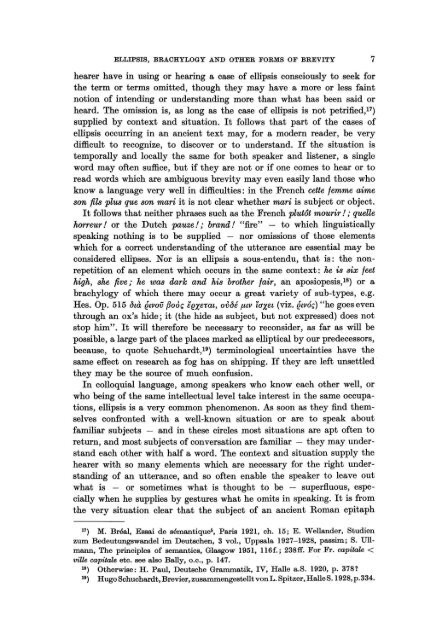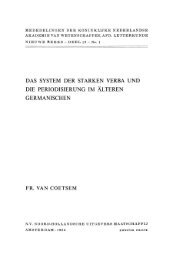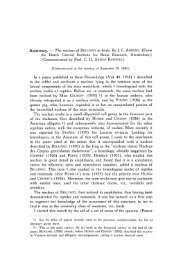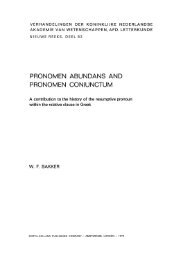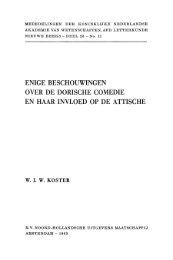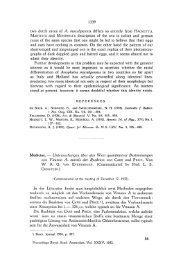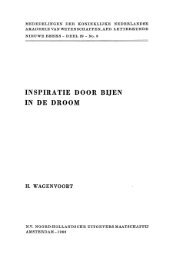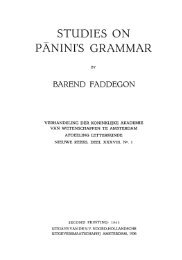Ellipsis, brachylogy and other forms of brevity in speech in ... - DWC
Ellipsis, brachylogy and other forms of brevity in speech in ... - DWC
Ellipsis, brachylogy and other forms of brevity in speech in ... - DWC
You also want an ePaper? Increase the reach of your titles
YUMPU automatically turns print PDFs into web optimized ePapers that Google loves.
ELLIPSIS, BRACHYLOGY AND OTHER FORMS OF BREVITY 7<br />
hearer have <strong>in</strong> us<strong>in</strong>g or hear<strong>in</strong>g a case <strong>of</strong> ellipsis consciously to seek for<br />
the term or terms omitted, though they may have a more or less fa<strong>in</strong>t<br />
notion <strong>of</strong> <strong>in</strong>tend<strong>in</strong>g or underst<strong>and</strong><strong>in</strong>g more than what has been said or<br />
heard. The omission is, as long as the case <strong>of</strong> ellipsis is not petrified,17)<br />
supplied by context <strong>and</strong> situation. It follows that part <strong>of</strong> the cases <strong>of</strong><br />
ellipsis occurr<strong>in</strong>g <strong>in</strong> an ancient text may, for a modern reader, be very<br />
difficult to recognize, to discover or to · underst<strong>and</strong>. If the situation is<br />
temporally <strong>and</strong> locally the same for both speaker <strong>and</strong> listener , a s<strong>in</strong>gle<br />
word may <strong>of</strong> ten suffice, but if they are not or if one comes to hear or to<br />
read words which are ambiguous <strong>brevity</strong> may even easily l<strong>and</strong> those who<br />
know a language very weIl <strong>in</strong> difficulties: <strong>in</strong> the French cette femme aime<br />
80n fils plus que 80n mari it is not clear whether mari is subject or object.<br />
It follows that neither phrases such as the French plutót mourir! ; queUe<br />
horreur! or the Dutch pauze!; br<strong>and</strong>! "fire" - to which l<strong>in</strong>guistically<br />
speak<strong>in</strong>g noth<strong>in</strong>g is to he supplied - nor omissions <strong>of</strong> those elements<br />
which for a correct underst<strong>and</strong><strong>in</strong>g <strong>of</strong> the utterance are essential may be<br />
considered ellipses. Nor is an ellipsis a sous-entendu, that is: the nonrepetition<br />
<strong>of</strong> an element which occurs <strong>in</strong> the same context: he i8 8ix feet<br />
high, 8he five; he was dark <strong>and</strong> hi8 'br<strong>other</strong> fair, an aposiopesis,18) or a<br />
<strong>brachylogy</strong> <strong>of</strong> which there may occur a great variety <strong>of</strong> sub-types, e.g.<br />
Hes. Op. 515 c5là él'VOV fJodç eeXE.al, oMé f-ll'V laXEl (viz. él'VÓÇ) "he goes even<br />
through an ox's hide; it (the hide as subject, but not expressed) does not<br />
stop him". It will therefore he necessary to reconsider, as far as will be<br />
possible, a large part <strong>of</strong> the places marked as elliptical by our predecessors,<br />
hecause, to quote Schuchardt,19) term<strong>in</strong>ological uncerta<strong>in</strong>ties have the<br />
same effect on research as foghas on shipp<strong>in</strong>g. If they are left unsettled<br />
they may be the source <strong>of</strong> much confusion.<br />
In colloquial language, among speakers who know each <strong>other</strong> weIl, or<br />
who he<strong>in</strong>g <strong>of</strong> the same iiltellectuallevel take <strong>in</strong>terest <strong>in</strong> the same occupations,<br />
ellipsis is a very common phenomenon. As soon as they f<strong>in</strong>d themselves<br />
confronted with a well-known situation or are to speak about<br />
familiar subjects - <strong>and</strong> <strong>in</strong> these circles most situations are apt <strong>of</strong> ten to<br />
return, <strong>and</strong> most subjects <strong>of</strong> conversation are familiar - they may underst<strong>and</strong><br />
each <strong>other</strong> with half a word. The context <strong>and</strong> situation supply the<br />
hearer with so many elements which are necessary for the right underst<strong>and</strong><strong>in</strong>g<br />
<strong>of</strong> an utterance, <strong>and</strong> so <strong>of</strong> ten enable the speaker to leave out<br />
what is - or sometimes what is thought to be - superfluous, especially<br />
when he supplies by gestures what he omits <strong>in</strong> speak<strong>in</strong>g. It is from<br />
the very situation clear that the subject <strong>of</strong> an ancient Roman epitaph<br />
17) M. Bréal, Essai de sémantique 5 , Paris 1921, eh. 15; E. Well<strong>and</strong>er, Studien<br />
zum Bedeutungsw<strong>and</strong>el im Deutsehen, 3 vol., Uppsala 1927-1928, passim; S. Ullmann,<br />
The pr<strong>in</strong>eiples <strong>of</strong> semanties, Glasgow 1951, 116f.; 238ff. For Fr. capitale <<br />
ville capitale etc. see also Bally, o.c., p. 147.<br />
18) Otherwise: H. Paul, Deutsehe Grammatik, IV, Halle a.S. 1920, p. 378?<br />
19) Hugo Schuehardt, Brevier, zusammengestelltvonL. Spitzer, HalleS. 1928, p.334.


